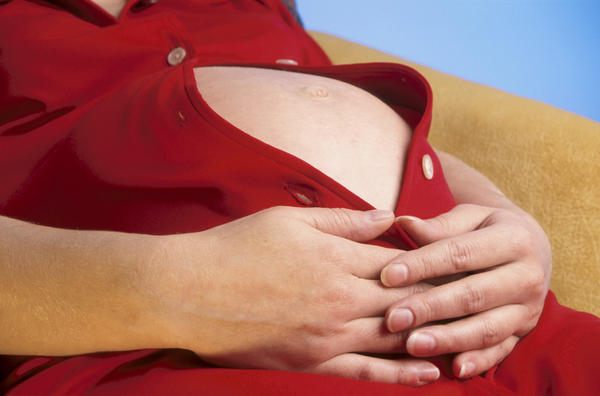During pregnancy, a group of changes that occur to the body may permeate. These changes continue throughout the body, including changes in the vagina during pregnancy, especially in the early stage. This is very common. In fact, after two weeks of pregnancy you may notice changes in your vagina such as your cervix becoming purple in color or experiencing any itching, bleeding or a strong smelling discharge. You should be aware of a set of changes that will help you to avoid any trauma during the next nine months, especially when it comes to changes in the vagina during pregnancy.

There are a number of changes that occur to the vagina during pregnancy that it is necessary to be aware of to consult a doctor in case of any problem or symptoms of diseases that affect pregnancy.
Vaginal changes during pregnancy
1. The color of the vagina turns blue:
The color of the vagina is usually pink. But during pregnancy, the color of the vagina can turn blue. This change can appear after 6 weeks of pregnancy. And the color of the cervix begins to take a purple or blue color, due to the increased blood flow. According to Brett Worley, MD, Ohio State University Wexner Medical Center.
2. There may be blood:
You may discover this change during the first three months, which is the presence of blood in the vagina. More than 50% of women suffer from spotting or bleeding in the vagina during pregnancy. But you need to consult a doctor about this even if the bleeding stops. Mary Russo, MD, in the Bronx, New York, states that the most common and most effective way is to find out if there is any concern. There is usually little blood as a result of implantation in the uterus and the formation of the placenta. However, in some cases, it can indicate something else, such as a yeast infection, especially if this bleeding is accompanied by pain and cramps. You need to call your doctor and consult your medical provider.
3. You may notice varicose veins:
Surprisingly, the legs are not the only place on the body prone to varicose veins and prone to swelling. Yes, pregnant women can suffer from purple varicose veins due to the increased blood flow and the enlargement of the uterus, which puts pressure on the veins in the pelvis. There are about 10% of women whose pregnancy hormones lead to the presence of varicose veins during the first five months of the second pregnancy, and it increases with the increase in the number of pregnancies.. According to specialists, it is like normal varicose veins. But the good news to you here is that this problem can disappear within six weeks of birth. You can try to relieve these annoying symptoms through warm baths, sleeping on the left side, raising the feet whenever possible, raising the feet and avoiding sitting or standing for long periods.
4. Feel your vagina swollen:
When the amount of blood flowing into the vagina increases, you may feel that the vagina is swollen and grossly open. For many women, the condition of providing larger amounts of blood increases this feeling.
5. You feel wind coming out of your vagina.
Many medical literature mentions that one of the changes in the vagina during pregnancy is the feeling of gas coming out of the vagina and it does not indicate anything bad. This feeling increases with the increase in pressure on the abdomen, the various positions of intimacy, excessive pelvic contractions, and exercise.
6. Increased vaginal itching:
Pregnancy hormones can cause an overgrowth of naturally occurring bacteria in the vagina and the fungi that lead to bacterial vaginosis or yeast infection, both of which lead to itching. It is common for these infections to occur during pregnancy and you find white or yellow discharge from the vagina. It is very natural to notice an increase in mucous secretions in the vagina, which completely changes its smell. Dr. Bolt states that these changes continue throughout pregnancy are thick and sticky and at first become thin and watery.
7. Vaginal odor changes:
Bolt adds that the pH of the vagina changes during pregnancy, and can cause slight changes in vaginal odor, making it less acidic. Some pregnant women are more sensitive to the smell, but it is often accompanied by itching and irritation in the vagina and finds a change in the taste of the vagina and a change in the pH. According to Postpartum Magazine, the taste of the vagina tends to be metallic or salty and, interestingly, the flavor usually changes and disappears with orgasm.
8. Taste different:
This change occurs over time due to the change in the acidity balance of the vagina, which not only affects the smell of the vagina, but also the taste. As we mentioned above, the taste of the vaginal secretions becomes slightly salty and metallic.
9. Increased secretions:
Vaginal secretions continue until delivery. This is due to the presence of an abundance of hormones that stimulate the production of secretions. Although it is annoying, it is white secretions and has a thickness like milk. These vaginal secretions help balance healthy bacteria.
10. Seeing more ingrown hairs
According to the American Pregnancy Association, many women suffer from ingrown hairs during pregnancy due to the increased secretion of estrogen. Which makes hair grow at a faster rate. In fact, the body produces more sweat during pregnancy, which means that the pores are clogged more than usual.
Tips to maintain a healthy vagina:
Choosing the right underwear:
It is preferable to wear cotton underwear, especially during the hot summer, and work to change underwear often during the day. Make sure to avoid wearing tight clothes because they limit the entry of air and exacerbate the condition.
body hydration:
In general, eating more water helps you get rid of toxins and parasites in the body, as water acts as a natural tonic and detoxifier, thus protecting it from various diseases.
Not washing the vagina too much:
When washing the vagina with harsh chemicals, it can strip the vagina of moisture and essential bacteria that help maintain the acidity balance in the vagina and thus make the vagina vulnerable to the growth of bacteria, infections and various diseases easily.
Avoid perfumes.
This is because deodorants and perfumes can destroy the natural environment of the vagina and they can irritate the vagina and increase itching and redness of the vagina.
Attention to personal hygiene:
It is very important to take care of personal hygiene, especially in the summer and hot weather. Make sure the sensitive area is kept as dry as possible and avoid going out in the sun for long periods. It is also preferable to use warm water to get rid of sweat and dirt

